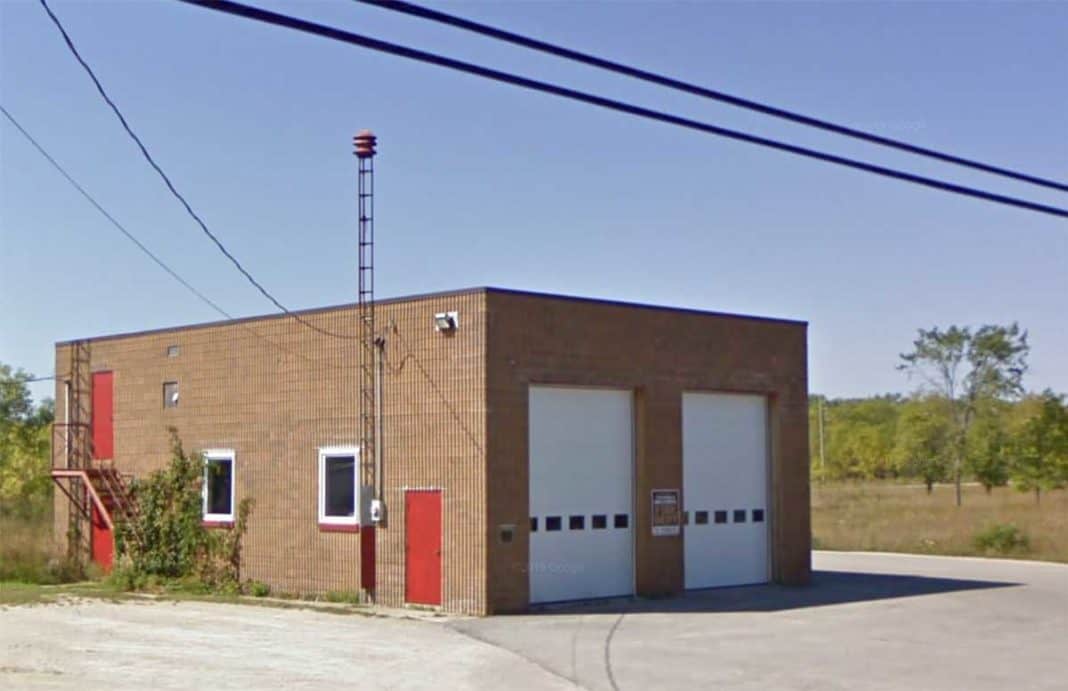KAGAWONG – Preliminary discussions on the merits of replacing or renovating Billings Township’s aging fire hall saw council members leaning towards a retrofit of the existing facility. At a special council meeting on January 27, council considered staff recommendations and options presented in a Fire Hall Scoping Report prepared by Tulloch Engineering for the municipality.
A dedicated special council meeting for council to examine the potential options for repairs and upgrades to the existing fire hall building or construction of a new facility had been recommended at a regular council meeting last December 20.
The options as presented in the report include renovating the existing fire hall building at a cost of $556,250; demolishing the existing fire hall and constructing a new one of the same size and configuration, at a cost of $845,000; or constructing a new (larger) fire hall on an alternate site, at a cost of $1,753,875. Additional costs for property development and site services of approximately $350,000 would be required. Estimates do not include design, permitting or HST costs.
A staff memorandum pointed out that there is no funding available for either a renovation project, rebuild or new construction at this time.
In a preamble to the discussion, Mayor Anderson pointed out the municipality’s asset management plan (AMP), strategic plan and the recently adopted community energy and emissions plan (CEEP) are additional considerations for council prior to any decision being made. The township is currently updating an AMP that was completed in 2013. “This AMP addresses the lifecycle costs of the current capital assets of the municipality and the cost to maintain them over their lifecycle,” he said. A completed draft was to have been presented to council at its February 1 regular meeting.
The strategic plan, also being updated, prioritizes things within the municipality that council needs to address, with municipal properties and buildings identified as the second highest priority item. “The other thing we have to keep in mind is that anything we do in terms of repairs or new builds must be done in concert with our adopted CEEP,” the Mayor added. “We have a very high standard, I believe, for things we would like to do to reduce greenhouse gases and reduce our carbon footprint. Anything we do, regardless of whether it’s repair or rebuild, has to keep the CEEP front and centre and it has to be integrated into whatever plan that we have.”
Cost and location were key factors for all councillors when considering options, were energy efficiency, population growth and potentially underestimated costs for all options. “If we should decide on doing this and the money isn’t readily available, I think we should prioritize the main issues,” said Councillor Michael Hunt.
“Obviously, doing a repair would be the least expensive,” said Councillor Sharon Jackson. “I also believe it would have the least impact in service interruption for our fire department. We know we must provide fire protection to the residents of our township and our fire department deserves to have a safe place to train and be dispatched from in order to keep us safe.”
“We’ve been looking at fixing the fire hall for a very long time and it’s just great that we’re actually getting down to the nuts and bolts of it,” noted Councilor Sharon Alkenbrack. She also preferred the existing location. While renovation is the cheapest route, she said she wants to ensure that as the community grows, the fire hall meets any additional requirements for service.
“We have a fire hall that fulfills the needs of the township that is in a state of disrepair,” said Councillor Bryan Barker. “We all recognize that it needs to be fixed sooner rather than later. Option one will allow us to repair the hall and at the same time, make it more energy efficient and reduce that cost significantly.”
“I fully support option one,” added Councillor Barker. “It gives us a safe, clean building that is efficient and that we can afford. We do have a CEEP, as (Mayor Anderson) mentioned and the township is committed, regardless of what option we go with, to the reduction of greenhouse gas emissions and energy saving as outlined in our CEEP. Regardless of which option we decide on, these measures were identified in the Tulloch report to make all three options energy efficient.”
Billings Township has an aging population, with 30 percent of inhabitants 65 to 84 years old, 38 percent between 45 to 64 years old and only 13 percent from 25 to 44 years, said Mayor Anderson. “I can tell you that according to the (2016) census, the mean average income is $45,000, which was likely at one time quite a bit of money. It’s not anymore.”
Council must remain cognizant of this fact, he said. “It’s always this balancing act, trying to get things that are fair for everybody and reasonable without putting undue strain on people.”
While the mayor did not want to discount option one, he did remind council that they needed to consider all options. Option two, demolition of the existing structure and constructing a new fire hall of the same size and configuration on that site, did not garner much council support.
“We’re getting the same building on the same footprint that could be renovated and remediated for $556,250 rather than $845,000,” said Councillor Barker. “For a few hundred thousand more to have the same product at the end of the day doesn’t make a whole lot of sense.”
Councillor Hunt pointed out the possibility of foundation problems. Councillor Jackson agreed. “Until we start digging, we don’t know what we’re going to find,” she said.
A suitable location would be required for option three. The only location that meets requirements would be where the current dog park is located. The nearly $2 million price tag was concerning to council members. Councillor Alkenbrack wondered if there were any township properties that could be sold to offset the cost of any of the options.
Should council determine a need for a new, larger fire hall, then a new public works building should also be considered and the possibility of converting the public works garage into a fire hall. “These two cannot be considered in isolation,” stated the memo.
Calls for service to Billings’ fire department have been increasing every year, said Fire Chief Martin Connell. In 2019, there were 10 calls for service, with 14 and 17 calls in 2020 and 2021, respectively. House fires, for the most part, are on the decrease but there are substantially more calls for brush fires. Also on the rise are calls for vehicle collisions, including requests for traffic control at collisions. There has been an increase in carbon monoxide calls and more rescues in the river basin. The fire department also sees more lift assistance calls by EMS.
A third vehicle with four-wheel drive and a third bay would be essential as the department increases its services and would be helpful for access to brush fires, Mr. Connell said. “If we do have a very dry year we could be at risk of a severe forest fire. The key is initial response.”
Mayor Anderson asked Mr. Connell if there would there be room to add a third, smaller bay adjacent to the current building. Mr. Connell said it is possible, but parking would become a bigger issue than it already is for volunteers.
“We have enough to work with here, at least to get us started,” concluded Mayor Anderson. “There are things I would like further clarification on, but I think we’ve made some progress for getting things started.”





